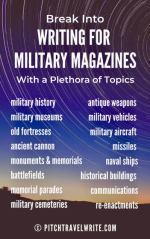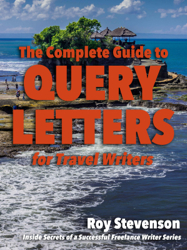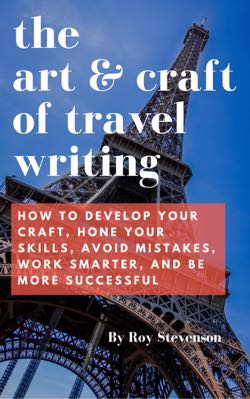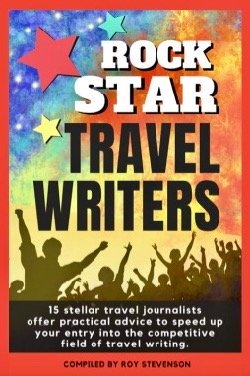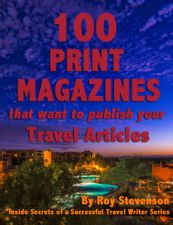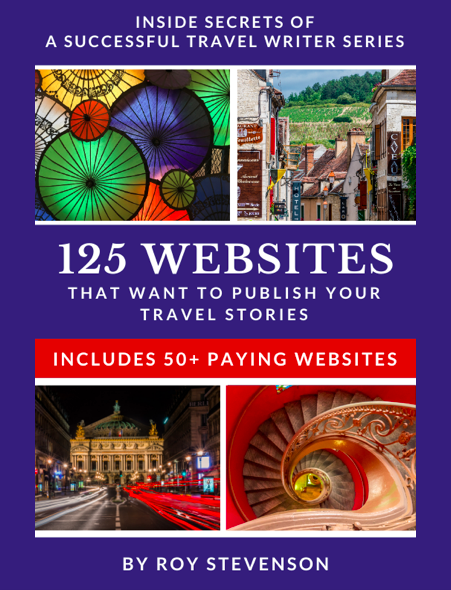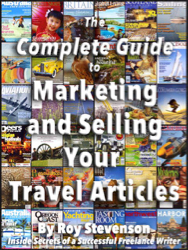- Home
- Query Letters
- Query Letter Follow up
Query Letter Follow Up Guidelines
By Roy Stevenson
Query letter follow up is often a mystery to new travel writers. Should you follow up with an editor or shouldn't you?
Freelance travel writing is shrouded in a whole litany of rules and DO’s and ‘DON’Ts. I believe that many of these rules are not constructive and many are downright counterproductive.
Some are just a waste of time. In this category is the rule “you should always follow up on your queries with a magazine editor.”
While reviewing books on freelance writing, I noticed all the experts said you should contact the editor about 2-4 weeks after you’ve sent your query. The purpose of doing this is to remind the editor of your query and see if they’re interested in your story.
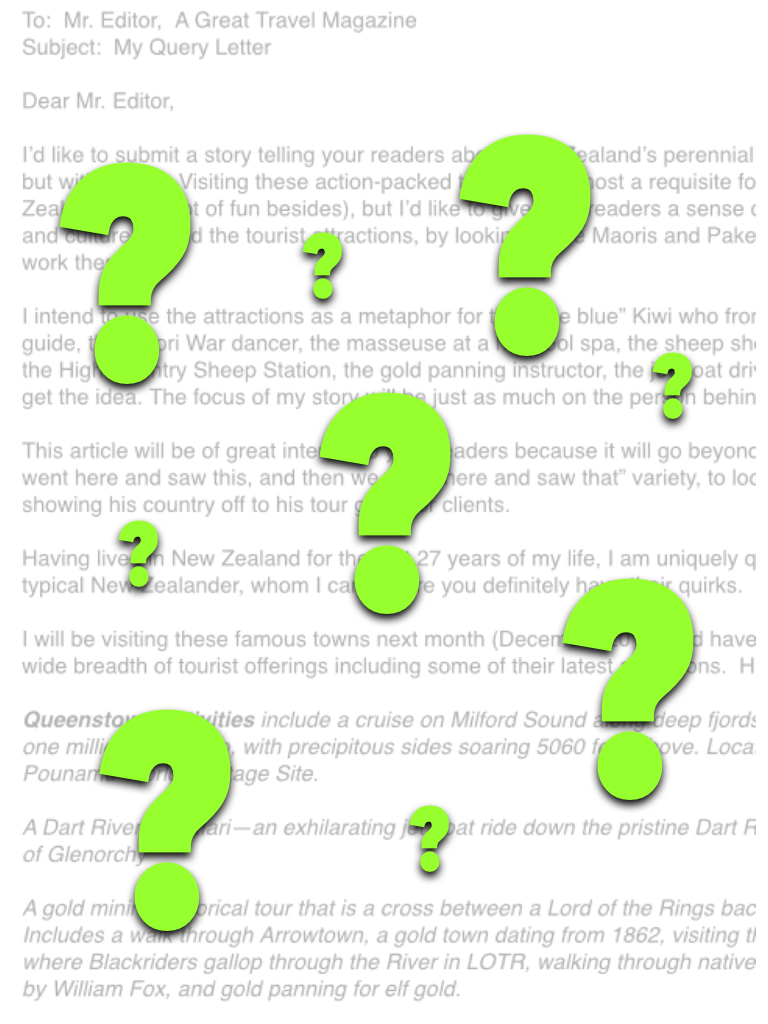
For those of you who read my posts regularly, you know marketing
magazine articles is my thing. I’ve discussed the practice of query letter follow up with many of my travel-writing peers on press trips. We
spend a lot of time cooped up in shuttles and vans, so naturally we like
to talk shop and pick each others brains.
Without exception, my
peers all tell me that, over the years, they’ve picked up one or two
stories this way. It seems that occasionally the editor has had his or
her memory jolted about the pitch, and then accepted it for
publication. But it doesn’t happen often.
5 Reasons Not to Do Query Letter Follow Up:
- Query letter follow up is time consuming for you and the editor, and the miniscule return on this practice is simply not worth it.
- Editors generally don’t like being bugged by overeager freelance writers unless you have a longstanding relationship with them.
- Editors have different policies regarding their response time to a query letter. Some promise to respond to your query within one or two weeks, while others state that if you haven’t heard back from them within 6-8 weeks, assume they’re not interested in your pitch. In this case they’re actually telling you not to follow up.
- If you haven’t heard back from an editor within one to two weeks, it’s likely they’re not interested in your story ideas. Here’s why: if your query captured the editor’s attention and is a good fit for their editorial calendar, they’ll reply quickly. Often, very quickly.
- If you feel strongly that the editor should have responded to you after 2-4 weeks, you can do a polite query letter follow up. Simply mention in the subject line that it's a follow up and include your original query. Editors do get busy and it could have been lost in their Inbox. This gives an editor an opportunity to read the query again and either accept or reject it.
I’ve never bothered following up on my queries because I sell 90% of my pitches the first time around. Most good freelance travel writers consider themselves lucky to get 25% - 40% of their stories accepted for publication.
I believe my high acceptance “hit” rate by magazine editors comes from doing a number of things thoroughly rather than just doing one thing.
There is a series of things you must do to boost your chances of convincing editors that your article will be a good fit for their magazine. But here’s the rub: every one of these things must be done well.

An Alternative to Query Letter Follow Up: Follow a Process that Works
I’ve developed a system that works practically every time and allows me to ignore the query letter follow up process. I call it my Marketing Mastery Links Formula™ for freelance travel writing. It includes all of these things:
1. Dreaming up a marketable story idea
2. Researching your topic thoroughly
3. Finding and researching publications to pitch the idea to
4. Creating a query letter that will resonate with the editor
5. Delivering a quality piece in a timely manner
6. Getting repeat business with that editor
As we all know, if a chain has a weak link, it will break at that link when the system is stressed.
If there is a deficiency in the preparation and presentation of your story pitch, an experienced editor will notice it and your chances of getting the piece accepted for publication decreases significantly.
Most experienced writers reading this will not be surprised at this system. If they’re successful, chances are they are doing these things. The point is that every single element is important.
If you neglect any one of the preparations in this chain, your chances of getting published plummet.
Many freelance writers think that writing a good query is what is most important in the pitching process. They concentrate their energies and time on that while neglecting to do some preliminary research on their topic.
But, a ‘hollow’ query letter that neglects to throw in some juicy and interesting facts and figures about the topic is more likely to result in a rejection. It won’t convince the editor that you know your subject.
In a similar way, a well-researched topic that is presented in a poorly written query letter is likely to get deleted from the editor’s inbox. In this day of “instant writers” the editor will simply continue on through his inbox to see what other stories are being offered.
You need to spend enough time researching your story ideas and getting your pitch right the first time. This is where to spend your valuable time. Otherwise, you’re wasting your time following up on your queries.
Do a bang up job of selecting and researching your topic, put together a good list of well-targeted magazines, and create a dynamite query letter. These things together add up to doing all you can to sell your story idea.
And if you don’t hear back from the editor over the next few weeks, accept that your travel story idea is not a good fit for that magazine. Move on!
Do you need help writing query letters that catch the attention of editors?
If you're looking for a guide to help you write query letters to editors, I've written The Complete Guide to Query Letters for Travel Writers to help you. It includes everything you need to know about query letters, along with 20 sample query letters that you can use as templates for your own queries.
Related articles that will interest you:
12 Query Letter Mistakes
Writing a Query Letter
100 Print Magazines that Want to Publish Your Travel Articles eBook

Roy Stevenson is a professional travel writer and the author of www.PitchTravelWrite.com. Over the past ten years, he’s had more than 1000 articles published in 200 magazines, trade and specialty journals, in-flights, on-boards, blogs and websites and has traveled on assignment around the U.S. and to dozens of international destinations.
IF YOU ENJOYED THIS POST, GET UPDATES. IT'S FREE.


